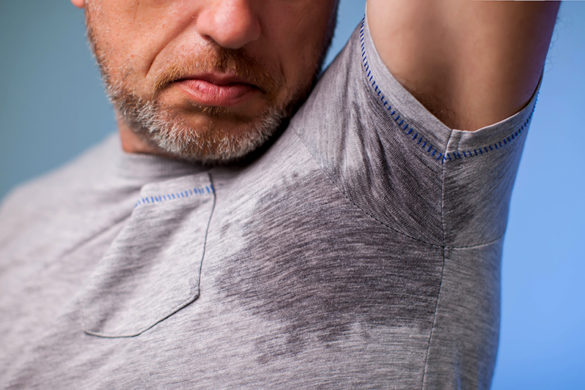Hyperhidrosis is the term for excessive sweating, which occurs mainly on the hands, feet, underarms, but can affect all areas of the body. Many people with this condition experience social embarrassment that can affect their quality of life. Excessive sweat can stain clothes, cause disturbing odour and strain social/business interactions.
What is hyperhidrosis?
 Sweating is controlled by the brain, which sends signals along nerves called “sympathetic nerves” to the small sweat glands in the skin. These nerves are part of the “autonomic nervous system” which controls many unconscious body functions.
Sweating is controlled by the brain, which sends signals along nerves called “sympathetic nerves” to the small sweat glands in the skin. These nerves are part of the “autonomic nervous system” which controls many unconscious body functions.
Increased sweating is a normal response to a rise in body temperature, and to emotions such as anxiety. Sweating is a normal part of the body’s natural cooling process. However, hyperhidrosis causes unnecessary perspiration at times when sweating is not needed for temperature regulation. People with hyperhidrosis can sweat excessively in air-conditioned rooms especially in reaction to stressful situations.
What causes hyperhidrosis?
- Localised symmetrical hyperhidrosis is the most common type of hyperhidrosis, this affects certain body sites (localised), and both sides equally (symmetrical). The palms, soles, under arm skin, face and scalp, or a combination of these, can be affected. The cause is not known. It often begins in the teens and tends to improve slowly as you get older. This type of hyperhidrosis is also called focal or primary hyperhidrosis.
- Generalised hyperhidrosis (affecting the whole body) can be caused by some illnesses including infections, and by hormonal conditions including the menopause, diabetes and an overactive thyroid gland. This type of hyperhidrosis is called secondary hyperhidrosis. Some medicines can also cause excessive sweating, including fluoxetine (Prozac) and similar antidepressants. Sometimes no cause can be found.
- Disease or irritation of the sympathetic nerves is a rare cause of increased sweating, either generally or in localised areas (typically just on one side).
- Anxiety can trigger or worsen hyperhidrosis, but this does not necessarily mean that the affected person is unusually anxious or stressed. Sometimes worry about sweating can create a vicious circle making the problem worse.
Is hyperhidrosis hereditary?
Hyperhidrosis is a feature of some rare inherited conditions. There is a trend for the common localised symmetrical type to run in families and up to a third of sufferers may have a family member with the condition.
What are the symptoms of hyperhidrosis?
Visible sweat, wet clothes and a clammy handshake can be embarrassing, and can interfere with work and personal relationships. Some people find hand sweating produces problems writing on paper.
Hyperhidrosis affects the water-producing (“eccrine”) sweat glands, and not the “apocrine” sweat glands that produce the oilier type of sweat which causes odour, especially under the arms. Therefore, bad odour is not a direct result of hyperhidrosis; however, if sweaty feet get soggy inside shoes, overgrowth of harmless skin bacteria can cause a bad smell.
If you are worried about excessive sweating, call us on 01603 819125 or email us at [email protected] where one of our expert dermatologists can provide you with a personalised hyperhidrosis treatment plan.


